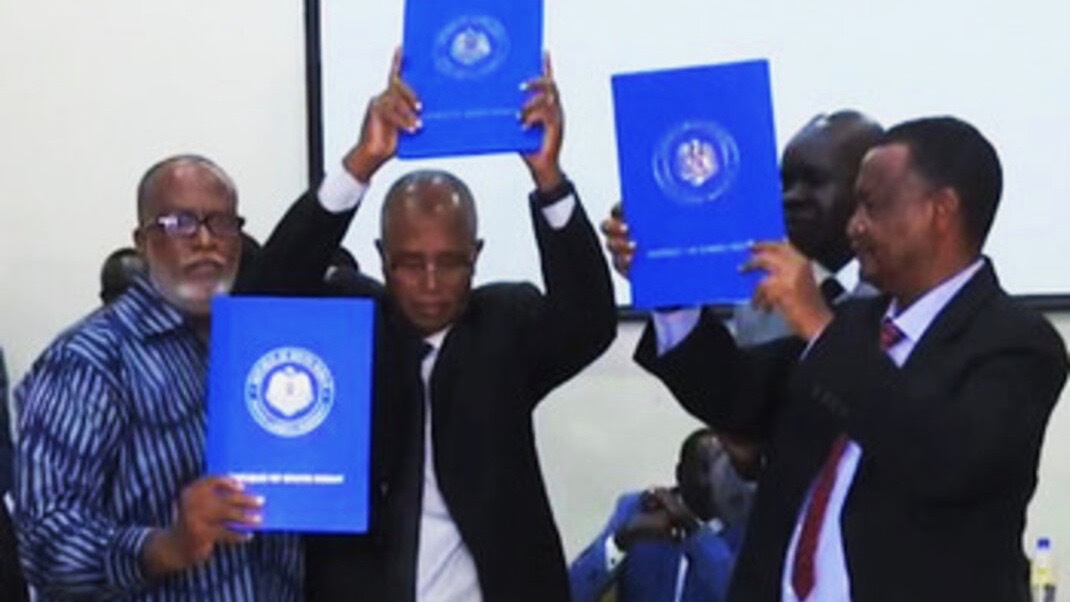On September 7, Monday, representatives of the Sudan Revolutionary Front (SRF) and the Sudanese transitional government signed their initials on a roadmap for the implementation of the peace agreement. The agreement was officially signed on August 31 in a formal ceremony in South Sudan’s capital Juba.
The Malik Agar-led faction of the Sudan People’s Liberation Movement North (SPLMN-Agar) was the main signatory from the States of South Kordofan and Blue Nile, known as the Two Areas. The government reached an agreement with the SPLMN-Agar as per schedule for the implementation of the political agreement and the security arrangements. This rebel faction will now dismantle its armed forces, which will be integrated into different organs of the state’s security apparatus.
Progress was also made last week towards reaching an agreement with the larger of the two SPLMN factions, led by Abdelaziz El Hilu (SPLMN – al Hilu), which had refused to be party to the peace agreement signed on August 31.
The SPLMN – al Hilu has long demanded the official separation of state and religion. The government, however, had initially deferred the decision on this matter to the constitutional conference which is supposed to be held after the final completion of the peace agreement.
The al-Hilu group had refused to budge on its stand, insisting that secularism is imperative to address the root cause of the various conflicts in Sudan, which are based on the discrimination faced by the non-Arab minority communities.
Alternatively, in the absence of the state’s official commitment to secularism, al-Hilu’s rebel faction insisted that the right to self determination of the people of the Nuba Mountains should be respected.
On September 3, there was a development towards the resolution of this impasse in a meeting held in Ethiopian capital Addis Ababa. The Sudanese prime minister, Abdalla Hamdok, and Al-Hilu signed a joint agreement in which the transitional government and the rebel group affirmed as a matter of principle that:
“A democratic state must be established in Sudan. For Sudan to become a democratic country where the rights of all citizens are enshrined, the constitution should be based on the principle of “separation of religion and state” in the absence of which the right to self-determination must be respected. Freedom of belief and worship and religious practice shall be guaranteed in full to all Sudanese citizens. The state shall not establish an official religion. No citizen shall be discriminated against based on their religion.”
Until the “separation between religion and state is actualized”, the agreement makes a proviso for the SPLMN- al Hilu to remain armed. It also makes arrangements for the “self-protection” of the “people of Nuba Mountains and Blue Nile”.
Both parties have also committed to “maintain the cessation of hostilities throughout the peace process until the security arrangements are agreed upon.”
Following this agreement, the representatives of the Sudanese Communist Party (SCP) held meetings with SPLMN-al Hilu over the weekend in Ethiopia. On September 6, the two parties made a political declaration, vowing to work together to ensure that secularism and internationally recognized human rights are ingrained as a fundamental and non-amendable part of Sudan’s constitution.
“The constitution or the law must not violate the freedoms and rights contained in the Universal Declaration of Human Rights and international and regional covenants. Any law issued in contravention of this declaration and charters shall be null and unconstitutional,” the declaration states.
Darfur
The roadmap for the implementation of the peace agreement in the other major conflict affected area in Sudan – the Darfur region – was initiated between the government and four rebel groups under the SRF on September 7.
According to Radio Dabanga, the four rebel groups in talks are the “Justice and Equality Movement (JEM), the Sudan Liberation Movement faction under the leadership of Minni Minawi (SLM-MM), the SLM-Transitional Council, the Sudan Liberation Forces Group, and the Sudanese Alliance (which includes 15 smaller rebel groups).”
The Abdelwahid El Nur-led faction of SLM (SLM-AW) is among the main rebel groups in Darfur which had refused to sign the agreement on August 31. This group has consistently maintained that it will not engage in negotiation with the government until security and stability is established in Darfur, where violence continues to flare up intermittently.
At a recent meeting with the representatives of the Sudanese Professionals Association (SPA), the prime minister had assured that progress was being made with El Nur’s faction as well. The SPA is a coalition of trade unions which had spearheaded the December 2018 revolution which ousted the former dictator Omar al Bashir and made way for the current transitional government.
The prime minister stated that he had spoken to El Nur on a phone call during his visit to Addis Ababa to sign the agreement with al Hilu. Without providing much detail, he described the conversation as “positive”.
The rebel group issued a clarification that this description is misleading, and no progress was made towards resolving the impasse. Its spokesperson clarified in a statement:
“All that was done in this regard is that Abdelwahid El Nur contacted Abdelaziz El Hilu during his presence in Addis Ababa, within the framework of constant communication between them. He found PM Abdallah Hamdok present, and greeted him as a Sudanese citizen based on the personal relationship that binds them. They did not address any issues related to peace, negotiations, or public issues.”





